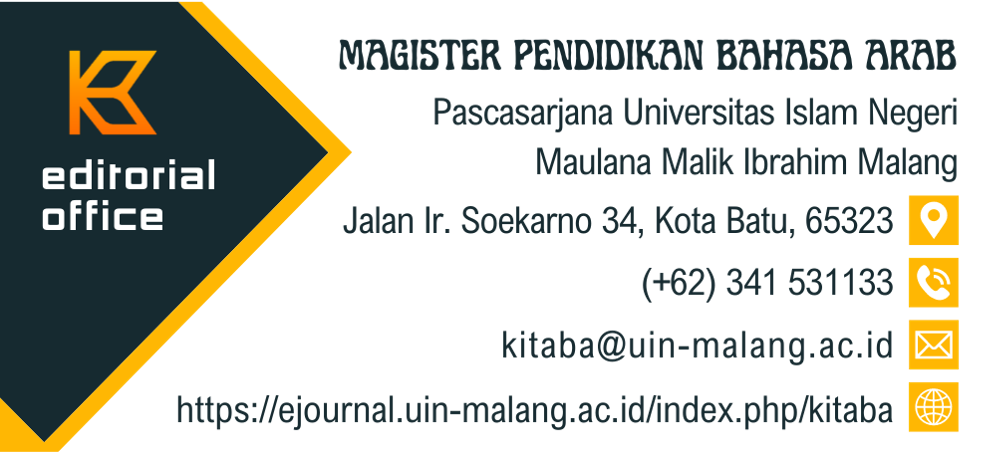Paper submitted in KITABA: Journal of Interdisciplinary Arabic Learning will be reviewed by some expert of Interdisciplinary Arabic Learning from several universities in different countries (double-blind review). It will take for about a month to conduct the review. Every paper submitted will be scanned for plagiarism before it is sent to the reviewer.
To be published in this Journal, a paper should meet general criteria:
- The paper submitted in the journal must be original, unpublished work, and not under consideration for publication elsewhere.
- Provides strong evidence for its conclusions.
- Should be a research result or literature studies in Interdisciplinary Arabic Learning field
- Ideally, interesting to researchers in Interdisciplinary Arabic Learning field and other related disciplines
In general, to be acceptable, a paper should represent an advance in understanding likely to influence thinking in the field. There should be a discernible reason why the work deserves the visibility of publication in KITABA: Journal of Interdisciplinary Arabic Learning rather than the best of the specialist journals.
KITABA Journal reviewers consist of experts and / or researchers specialized in the field of Interdisciplinary Arabic Learning, who work professionally by upholding the code of ethics for scientific publications.
After the manuscript is entered, at the initial stage the manuscript will be selected whether the substance of the manuscript is in accordance with the focus and scope of the journal and the originality of the manuscript. If it meets, then the manuscript will go through an internal review process and peer reviewers. The initial evaluation decision of the manuscript is a maximum of four weeks after the manuscript is received by the Editor.
Furthermore, the peer-review process of KITABA Journal manuscripts by peer reviewers is as follows:
First; Reviewers review manuscripts in accordance with their scientific fields and have the right to transfer manuscripts to other reviewers who are more competent with the approval of the Editor.
Second; The review process uses double blind review, that is, the reviewer does not know the identity of the author, and vice versa.
Third; The review process of one manuscript is carried out by at least one reviewer and the stage process is carried out with the E-Journal system.
Fourth; Reviewers assess the manuscript within a maximum period of 4 (four) weeks since the manuscript is received. The assessment is based on the quality of the substance of the manuscript, among others:
- Suitability of problems, objectives, theories, methods, and discussions;
- Clarity of presentation of images, tables and diagrams;
- The up-to-date of referenced libraries;
- Data errors and originality of information;
- Evaluate the integrity of the content of the manuscript;
- Manuscripts have never been published in other media;
- Breadth of knowledge and critical thinking of the author;
- The accuracy of the title with the overall content of the writing.
Fifth; If within that period the manuscript review has not been completed, the reviewer must confirm to the KITABA Journal Editorial Team.
Sixth; During the manuscript review process, the reviewer provides a manuscript assessment through the review checklist form / list available on the electronic journal application. If there are obstacles, reviewers can manually assess the manuscript on the review checklist form (Ms. Word format) sent by the KITABA Journal Editorial Team.
Seventh; The reviewer provides a decision on the manuscript of the review results:
- Accept Submission (naskah diterima).
- Revisions Required (naskah perlu direvisi oleh penulis dan dikembalikan lagi ke reviewer).
- Resubmit for Review (naskah sebaiknya direview oleh reviewer lain).
- Resubmit Elsewhere (naskah sebaiknya dikirim ke penerbit jurnal yang lain, reviewer menolak secara halus).
- Decline Submission (naskah ditolak).
- See Comments (lihat komentar, reviewer menolak secara halus).
Eighth; Reviewers send the manuscript of the review results and review checklist form to the KITABA Journal Editorial Team.












